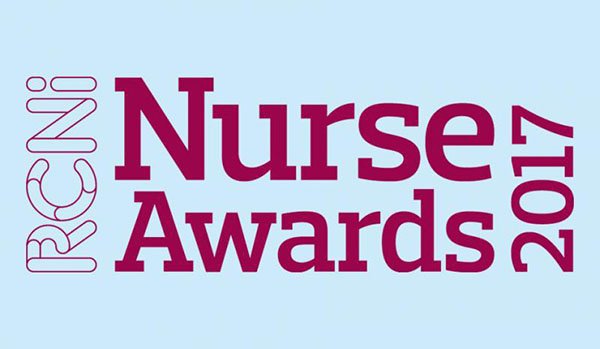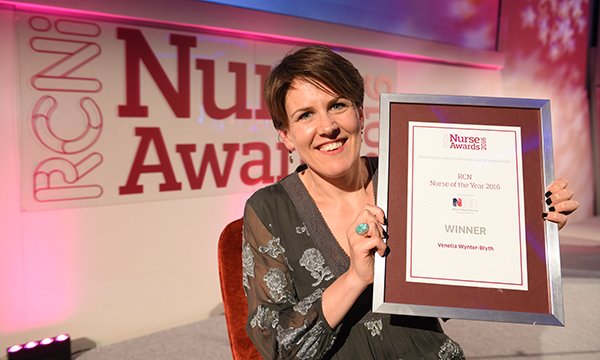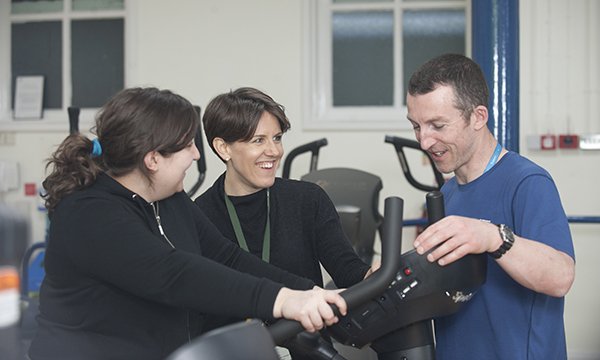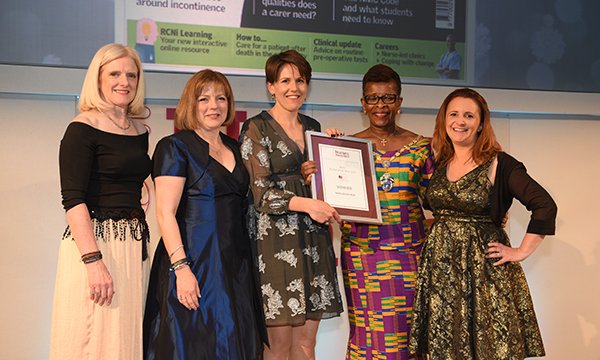RCN Nurse of the Year 2016: ‘Award win will open doors’

RCN Nurse of the Year 2016 Venetia Wynter-Blyth explains how winning the award has helped her expand her prehabilitation programme

‘The Nurse Awards have opened doors,’ says Venetia Wynter-Blyth, RCNi Nurse of the Year 2016. ‘I cannot emphasise enough how many opportunities have been presented to us as a result of winning this award.’
Ms Wynter-Blyth was named winner of nursing’s top accolade after her team’s programme PREPARE won the Innovations in Your Specialty category.
The holistic, tailored ‘prehabilitation’ programme, delivered at Imperial College Healthcare NHS Trust in London, is dramatically improving outcomes for people with oesophago-gastric cancer who require surgery, by encouraging them to participate in their care.
‘Winning at the Nurse Awards helped us see that we are on to something significant. It is such important recognition,’ says Ms Wynter-Blyth.
‘I am not a one-man band. The prehabilitation programme is an interdisciplinary, team effort, and together we have made the most of the opportunities winning the award has offered.

programme. Picture: Nathan Clarke
‘The award has brought the team together and kept us focused. We knew we had to keep the momentum going and it was the perfect opportunity to build on our progress.’
The team has certainly achieved that; an interactive digital health platform for patients, the ‘Prepare Companion’, is due to be piloted in January.
The platform provides personalised information about the patient’s diagnosis, treatment plan and prehabilitation programme. Patients are given weighing scales, accelerometers and a pulse oximeter.
These devices enable the patient and the healthcare team to monitor the patient’s progress and receive feedback. The companion is also able to offer an online peer support network.
‘By patients, for patients’
Ms Wynter-Blyth says she is proud that patients have been central to its development. ‘It has taken the platform to another level,’ she explains. ‘We have tried to better understand what our patient group needs to improve their cancer pathway. That collaboration is so powerful.
‘The e-health platform is designed by patients, for patients, which instantly resonates with everyone. Patient’s have a unique expertise and are the driving force behind its development. It is not healthcare professionals dictating what they think patients need.’
Crucial to informing and shaping the platform, Ms Wynter-Blyth says, was ensuring maximum qualitative feedback was received at numerous events with patients.
‘We wanted to understand what the potential barriers and facilitators were to the successful deployment of the digital health platform,’ she says. ‘The patient engagement events were integral to the design of this platform and ensured it was responsive to patient need.
‘We modified the platform after each event. It was and continues to be an iterative process, and that is a good thing. It shows people were engaged and wanting to be involved in innovation and change.’
‘Former and current patients will review the three-month pilot in January. We will gather real-time feedback from patients and carers at every stage of the patient journey.’
Pilot under way
In an exciting spin-off from PREPARE, the team has successfully applied for a grant to pilot remote health monitoring during the peri-operative period at home (before surgery and after discharge).
The Perioperative Remote Monitoring of Patients (PROMPT) System is part of the independent healthcare charity the Health Foundation’s £1.5 million Innovation for Improvement programme and will be piloted in January.
A feasibility study, published in our sister journal Primary Health Care, found the remote health monitoring of patients to be a motivational force.
The grant is ‘fantastic news’, says Ms Wynter-Blyth. ‘One of the key areas we need to explore is how we can improve the interface between primary care and specialist centres throughout the whole patient journey.’
To support PREPARE, Macmillan have supported the introduction of two new posts at Imperial: an exercise specialist and a project coordinator. As a result of this, the PREPARE team will be taking prehabilitation to other tumour groups and cancer areas in 2017.
Service expansion
‘We will have to modify PREPARE,’ says Ms Wynter-Blyth. ‘At the moment it is quite labour-intensive, but that is appropriate for the tumour type. We need to identify the ‘active ingredients’ and disseminate the programme to other healthcare settings in 2017.
‘Currently patients have a tailored programme, but for higher volume cancers we will look at a different models of prehabilitation. It may not be necessary for everyone to have highly individualised support, and group sessions may be appropriate. We will use the validated PREPARE screening tools to stratify patients accordingly.
But, she says, the principles will be exactly the same. ‘Our aim is to inform, engage and empower patients.’
She adds: ‘What became apparent from our feasibility study is that surgery cannot be looked at as an isolated intervention. The periods before and after surgery should be regarded as equally important if we are to improve outcomes.
Contributing to care
'Most of the before and after surgery care takes place at home, especially as a result of increasing demands on bed capacity. Healthcare professionals need to enable patients and their carers to be active partners in their care if we are to improve outcomes.’
For Ms Wynter-Blyth it is about enabling patients to contribute to their care, rather than nurturing a sense of dependency. The responsibility and the opportunity for patients to take control in a situation has psychological benefits that extend through to the recovery period, she says.
‘We have seen that strategies to improve self-efficacy during PREPARE translates into improved confidence after surgery,’ she says. ‘Self-efficacy interventions include achievement of personalised goals, vicarious experience, verbal feedback and encouragement.’
Equal partners
Ms Wynter-Blyth says crucial to PREPARE’s success was the whole-team approach, and everyone has embraced the programme.
‘We are all equal partners, and that includes the patients, working together to help them progress through their journey. Patient engagement and a whole-team approach is a simple way to improve outcomes, and it doesn’t cost anything.’

The Nurse Awards has helped the team ‘hugely’, she reflects. ‘I didn’t really expect anything to come of it. I didn’t even tell people until we were shortlisted. Then I thought it would be a lovely night out – we never expected to win the Innovations category and I was shocked to win Nurse of the Year.’
She urged nurses from all specialties to enter the Nurse Awards 2017. ‘As well as giving us the momentum to develop PREPARE, the awards have proved a great opportunity to raise awareness about prehabilitation. Winning such a prestigious award has ensured that people are ready to listen to us from trust upwards. I encourage everyone and anyone to apply.’
The closing date for entries is January 13th. To enter go to https://rcni.com/nurse-awards.
About the PREPARE programme
In my experience there was little or no structured support to prepare patients diagnosed with cancer for major surgery, potentially exacerbating anxiety.
The PREPARE team developed a four to twelve week programme to improve physiological, psychological and nutritional status prior to surgery. It provides a ‘buffer’ for patient’s to better withstand the stresses of surgery.
The individually-tailored PREPARE programme comprises physical activity, eating well, psychological well-being, asking about medications and respiratory exercises.
All patients see an exercise specialist, dietitian and nurse specialist at set time points in their treatment pathway. The ‘psychological well-being’ aspect of the programme is focused around strategies to improve self-efficacy and this sets it apart from traditional prehabilitation programmes.
Medication management and removal of bad habits, such as smoking, are also an integral aspect of the programme.
Patients are screened using validated tools and the results feedback into the programme and determine, for example, frequency of gym visits, goal setting etc.
The psychological component enhances and reinforces patients’ motivation and engagement, as does a strong element of peer support. Ms Wynter-Blyth explains: ‘Patients buddy up at the gym. They become part of a community of people who have the same challenges, and are working together to prepare.
‘The next step is to see whether prehabilitation can be recognised as a treatment in itself. Our results corroborate the evidence that suggests a period of structured prehabilitation can improve surgical outcomes.
‘Obviously we would not advocate delaying surgery so that it puts patients at risk. It is a balance and for those patients that do have a lead in time we want to put them in the best position for surgery, while also relieving pressure on target dates and breach dates.’
Award categories
- Cancer Nursing Practice
- Child Health Award
- Community Nursing Award
- Excellence in Cancer Research Award (sponsored by Cancer Research UK)
- Leadership
- Learning Disability Nursing Award (sponsored by NHS England)
- Mental Health Practice Award
- Nursing Older People Award
- Healthcare Assistant Award
- Innovations in your Specialty Award
- Patient’s Choice Award (sponsored by Yakult)
- Supporting Carers Award (sponsored by NHS England)

